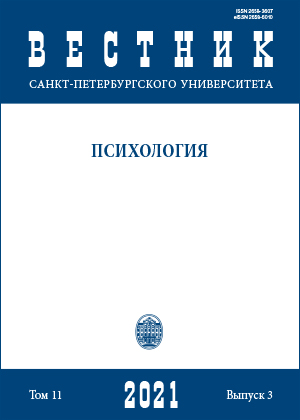Psychological predicates for the development of neurotic symptomatics in migrant students
DOI:
https://doi.org/10.21638/spbu16.2021.303Abstract
In Russia, educational migration ranks fourth among the reasons for migration. During educational migration, students experience stresses similar to those of Russian students associated with the passage of stages of development in relation to age, academic stress, intensified by moving and separation from important people, and stress inherent in the transfer processes: acculturation, associated with finding oneself in an unfamiliar culture and the need to handle complex concepts in an unfamiliar language, which, when delayed, flows into cumulative stress. All of these types of stress affect the health of students. Russian universities are interested in graduating not only erudite, but also healthy specialists and potential fellow citizens. This article presents data from an experimental study of the formation of neurotic disorders, alexithymia and situational and personal anxiety in migrant students in connection with the level and timing of adaptation to determine the targets of primary impact and correction, as well as highlight the relationship between neuroses, anxiety and alexithymia. The study included a sample of students living in Novosibirsk: 109 migrant students from Central Asian countries in the 1–3rd courses of study in adolescence from 17 to 20 years old (17.81±0.90). The following methods were used: Toronto alexithymic scale — 26, Spielberger — Hanin anxiety scale, STAI, Heck — Hess neuro- sis express diagnostic questionnaire and BFB. The significance of differences between individual indicators in the groups was determined using the Mann — Whitney U-test, and Spearman’s rank correlation coefficient was used for the level of relationships. The study showed a high level of anxiety, alexithymia and neurotic reactions in poorly adapted migrant students. More adapted migrant students showed lower rates of alexithymia and anxiety, while maintaining high rates of susceptibility to neurotic disorders, with prolonged acculturation. Thus, the timing of adaptation becomes important target for correction, with the need for events and trainings that raise awareness of Russian culture and mentality.
Keywords:
migrant students, adaptation, alexithymia, anxiety, neurosis
Downloads
References
References
Downloads
Published
How to Cite
Issue
Section
License
Articles of "Vestnik of Saint Petersburg University. Psychology" are open access distributed under the terms of the License Agreement with Saint Petersburg State University, which permits to the authors unrestricted distribution and self-archiving free of charge.




